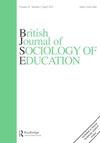构建中产阶级的抱负:地域习惯和高等教育的作用
IF 2.1
3区 教育学
Q1 EDUCATION & EDUCATIONAL RESEARCH
引用次数: 2
摘要
摘要本定性案例研究分析了美国一所农村大学中产阶级愿望的结构。使用Zipin及其同事提供的布迪厄框架,研究结果表明,尽管我们研究中的学生参与者相对于社会阶级背景的地位相似,但来自不同地理区域(即农村和城市)的学生在表达上大学和未来愿望方面表现出关键差异。我们认为,地方作为一个人习惯的重要特征,构成了学生上大学和未来的愿望。在美国高等教育高度分层的背景下,很少有学者承认地理和位置在塑造学生行为、选择和可能性方面的力量。在这样做的过程中,这项研究有助于越来越多的全球文献研究地方在塑造学生的高等教育愿望、机会、经历和结果方面的作用。本文章由计算机程序翻译,如有差异,请以英文原文为准。
Structuring middle-class aspirations: the role of place-based habitus and higher education
Abstract This qualitative case study provides an analysis of the structuring of middle-class aspirations at one rural university in the United States. Using a Bourdieusian framework offered by Zipin and colleagues, findings suggest that although student participants in our study are similarly positioned relative to social class background, those from distinct geographic areas (i.e. rural and urban) displayed key differences in expressions of college-going and future aspirations. We argue that place, as an important feature of one’s habitus, structures students’ college-going and future aspirations. Within the highly stratified context of higher education in the United States, few scholars have acknowledged the power of geography and place in shaping behaviors, choices, and possibilities for students. In doing so, this research contributes to a growing global body of literature examining the role of place in shaping students’ higher education aspirations, access, experiences, and outcomes.
求助全文
通过发布文献求助,成功后即可免费获取论文全文。
去求助
来源期刊
CiteScore
3.70
自引率
9.50%
发文量
74
期刊介绍:
British Journal of Sociology of Education is one of the most renowned international scholarly journals in the field. The journal publishes high quality original, theoretically informed analyses of the relationship between education and society, and has an outstanding record of addressing major global debates about the social significance and impact of educational policy, provision, processes and practice in many countries around the world. The journal engages with a diverse range of contemporary and emergent social theories along with a wide range of methodological approaches. Articles investigate the discursive politics of education, social stratification and mobility, the social dimensions of all aspects of pedagogy and the curriculum, and the experiences of all those involved, from the most privileged to the most disadvantaged. The vitality of the journal is sustained by its commitment to offer independent, critical evaluations of the ways in which education interfaces with local, national, regional and global developments, contexts and agendas in all phases of formal and informal education. Contributions are expected to take into account the wide international readership of British Journal of Sociology of Education, and exhibit knowledge of previously published articles in the field. Submissions should be well located within sociological theory, and should not only be rigorous and reflexive methodologically, but also offer original insights to educational problems and or perspectives.

 求助内容:
求助内容: 应助结果提醒方式:
应助结果提醒方式:


